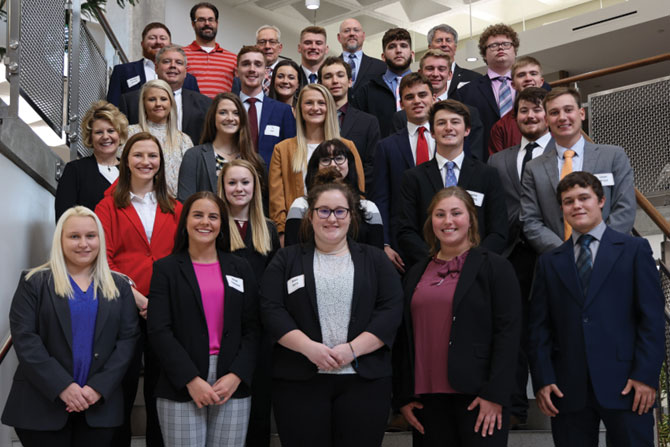As I was sitting down to finalize my magazine column for the month, I received a notice from the Nebraska Department of Labor indicating the state’s unemployment rate for September had fallen to 2.0%, tied for the lowest unemployment rate ever recorded by a state. Similarly, the rate in Lincoln had dropped to 1.3%, a record low for the Capitol City.
Every industry in the state, including banking, is facing monumental workforce challenges. Recent NBA analysis suggests Nebraska regularly has over 500 bank job openings. The reality is that the current workforce shortage may not subside for many years! Therefore, it is imperative the banking industry and the NBA think differently about how to attract and retain the best and brightest.
Causes for the lack of workers are varied. For years, demographers warned us about the coming war for talent tied to the mass retirement of the Baby Boomer generation. According to the labor market data company Emsi, in 2020 alone, approximately three million Baby Boomers left the workforce, many of them in highly-skilled and senior-level positions. COVID-19 has also drastically altered the employment landscape. The United States is experiencing a tidal wave of early retirements and a sizable number of people simply leaving the workforce. Finally, rural states like Nebraska have long struggled with the issue of “brain drain.” Experts at the University of Nebraska-Omaha Center for Public Affairs Research estimate the state annually loses 2,000 people between the ages of 25 and 35 who pursue career opportunities outside of the state.
To help address these challenges, the NBA is doubling down on its efforts to attend career fairs at colleges and universities, foster meetings with student groups, and create meaningful internships. We are also reevaluating our scholarship and philanthropic efforts. A recent review of the NBA’s agricultural banking internship program, for instance, found that around 35% of the more than 150 students who have participated in the program since its inception are still working in Nebraska banks. Almost 40% of the students who have participated in the program over the past three years work at Nebraska banks. Finally, two of the students who participated in the program this past summer have already accepted job offers for June 2022. Our banks have done such a good job training these students that even our competitors at Farm Credit are actively try to recruit these young finance/banking leaders. (Watch the NBA E-Update or reach out to Kara Heideman on our NBA team to find opportunities for your bank to engage with students and internship opportunities.)
While a sizable number of Nebraskans have traded in their full-time jobs for retirement or to pursue less structured opportunities, I would suggest that these individuals should be a primary recruitment target, assuming your institution is willing to be flexible. Not everyone is built for retirement; my dad retired three times. He liked to work so much that he actually worked part-time up until three weeks before his health got the best of him. I suspect there are bankers out there who share this desire to keep working even during retirement. Go get ‘em! I am also aware of a number of young mothers who are interested in part-time professional opportunities. Consider matching these individuals and offering a full-time shared position. While this may take some extra coordination on the bank’s human resource team, it is an efficient way to secure excellent employees who are committed to the bank.
Offutt Air Force Base in Bellevue is home to more than 8,000 military members. Each year, a sizable number of these individuals transition or retire from the military. To help service members with this transition, the Department of Defense offers the SkillBridge program that allows active-duty military personnel to spend the last 180 days of their military service interning at a civilian job. Additionally, participating companies are asked to coordinate a structured “educational work” experience allowing transitioning service members to evaluate careers. Participants continue to receive military pay and benefits and are not paid by the sponsoring company. Even if your bank is outside the Omaha metro area, you can participate in the SkillBridge program. In addition to educational and employment services for military members, the Department of Defense Spouse Education and Career Opportunities program provides career services for military spouses, including the Military Spouse Employment Partnership job network.
Finally, remote work opportunities have evolved as a mainstream workforce strategy, thanks in large part to the pandemic. Nebraska banks have historically been recognized for offering flexible work environments, with many institutions focused on “family first.” Clearly, not every position within a bank can be performed remotely, but COVID-19 allowed the industry to identify positions that could be offered with even greater schedule flexibility. The NBA team has talked recently with several banks that plan to keep a portion of their team members in a hybrid model. Further, I have talked with bank leaders who now rely upon key managers who work entirely remotely. There is no question that remote flexibility creates significant challenges and opportunities, with a sizable number of unknown factors. However, current times may require new strategies and priorities.
Again, I encourage you to throw out your traditional view on the workforce and begin to think about how the future will look different. The NBA will be your partner as we move through these challenging times together.
Contact Richard Baier at (402) 474-1555 or richard.baier@nebankers.org.









